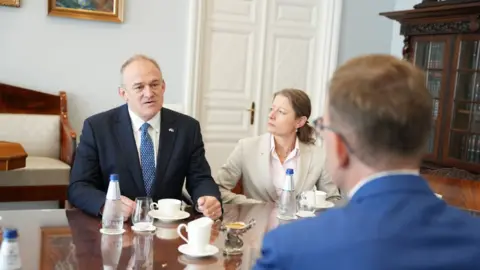In a provocative proposal aimed at bolstering the UK armed forces, Liberal Democrat leader Sir Ed Davey has suggested that new recruits to the military should be offered a significant signing bonus of £10,000. This initiative is part of a broader strategy to increase troop numbers and address what are being described as the challenges posed by a tumultuous global landscape. According to the Lib Dems, this measure would urgently enhance the UK’s trained soldier count from a current status of just below 71,000 to over 73,000 personnel, a necessary response to the perceived threats from global leaders such as Russia’s President Vladimir Putin and the United States’ President Donald Trump, both labeled as unpredictable figures.
In conjunction with the bonus initiative, Sir Ed has proposed a comprehensive public awareness campaign that would promote preparedness among British households for potential conflict scenarios, including cyber-attacks and blackouts. The goal is to ensure that every home in the UK is adequately equipped to handle emergencies stemming from international conflicts. This initiative underscores a shift in focus, suggesting that national defense not only relies on military strength but also on civilian readiness.
The proposed financial package for new recruits includes additional incentives for former military personnel, who would receive £20,000 for re-enlisting and serving an additional two years. Current financial compensation for new recruits remains competitive, with starting salaries for the British Army listed at £26,334 per annum. Additionally, a government retention scheme introduced last November allows certain categories, such as engineers, to receive retention payments for extending their service commitments.
Sir Ed’s visit to Estonia over the weekend, where he met with British troops, highlighted the urgency of these proposals. Describing the situation as vital “frontline” development against Russia, he expressed a clear need for enhanced military preparedness in the face of external threats. He argued, “It is clear given the threat of a barbaric Putin and the challenge of an erratic Trump, we need to do more to make Britain war-ready.”
These assertions form part of a larger Lib Dem strategy to increase military spending, proposing an increase to 2.5% of the UK’s GDP by 2027, building upon pledges made by the Labour party. The funding for these initiatives, including the lucrative signing bonus scheme, is suggested to come from heightened taxation on digital services. Specifically, the political party recommends a 2% levy on major social media and technology companies, a measure expected to generate approximately £800 million annually.
The Lib Dems assert that their proposed bonus scheme is designed to quickly augment the number of trained soldiers, increasing their ranks from the latest figures showing 70,752 personnel. Meanwhile, the UK government has already indicated plans for a modest increase in its full-time military numbers to 76,000 soldiers by 2029, although the financial backing for this expansion is yet uncertain. Additionally, Labour has floated ideas for increasing the Active Reserves by 20% when budget conditions permit, a likely future development after proposed reforms within the armed forces take place.
Current discussions also encompass broader efforts to enhance the living conditions for military personnel. The government is currently in talks regarding a £7 billion investment plan for military housing, initially returning control of accommodation provisions to the Ministry of Defence. Upcoming reforms within housing practices hope to address growing dissatisfaction among service members, as highlighted by surveys indicating that nearly a third of UK troops are contemplating leaving the forces due to poor housing conditions.
In summary, Sir Ed Davey’s proposals reflect the Liberal Democrats’ proactive stance on national defense, emphasizing troop readiness and civilian preparedness in an increasingly uncertain global climate, while seeking innovative funding solutions to expand military capabilities. The ongoing dialogues around military housing and troop conditions signify a critical approach to addressing the retention and recruitment crises faced by the UK armed forces.



